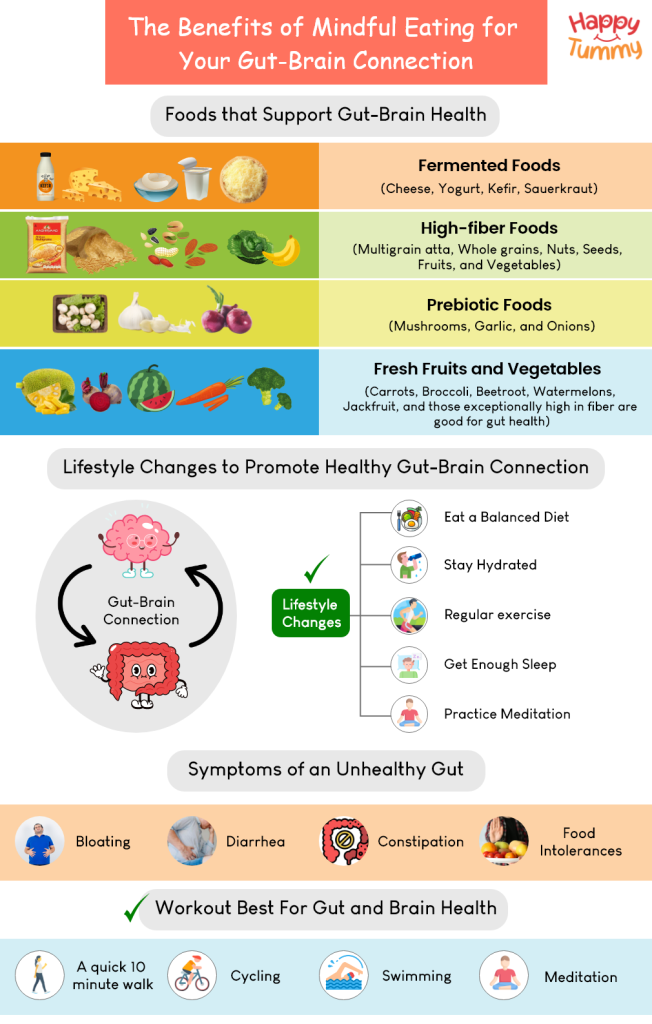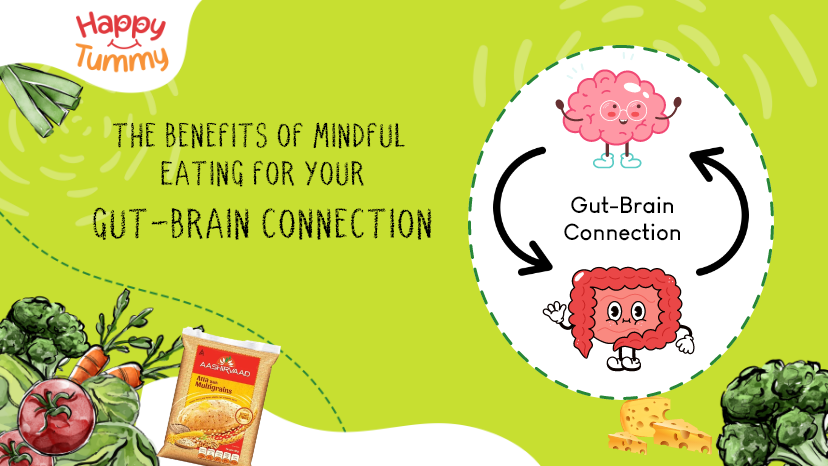Table of Contents
Your digestive system and brain are closely linked, as you may have often realized if you’ve ever experienced “butterflies in your belly” during a tense circumstance or felt sick before a big event. But did you realize there’s more to this link than just a slight jitteriness?
Your digestive system’s wellness significantly impacts your overall health, and a healthy gut supports a robust immune system. A happy gut-brain will elevate your spirits, keep your energy levels high, and improve your general health.
Further, several factors can influence how happy we are daily, like climate, our surroundings, lifestyle, and relationships may make us happy or depress us. However, most importantly, our food significantly impacts our mood.
Just eating to satisfy our taste buds is insufficient. We need to eat in a way that alleviates the trillions of microorganisms that live in our digestive tract if we want to experience optimal health, wellness, and happiness.
Our food may shape and change our interaction with gut microorganisms. We experience joy when our numerous microbes are content and our tummy is healthy, much like our human companions.
Maintaining a healthy gut is essential for several reasons beyond just digestion. Your gut and stomach may improve if you adopt many healthy habits.
Remember, “A happy tummy is a sign of a healthy gut-brain.
So this article will discuss the relationship between your gut and brain and how becoming aware of it will help you take charge of your digestive health.
The Role of the Digestive System
Understanding digestive functioning is essential to take charge of the fitness of our body. The digestive system consists of several organs that combine to convert food into nutrients your body can utilize.
The bloodstream transports nutrients to the body’s various organs. The brain has direct effects on our stomach and intestine. An unpleasant tummy can send messages to the brain in the same way that a problematic brain can. Thus, stomach or digestive distress might result from tension, anxiety, or despair. This is due to the strong connection between our gut and brain (Gut-Brain).
Gut-Brain Connection

The term “gut” refers to the gastrointestinal (GI) tract [1]. Digesting food, extracting nutrients, and eliminating waste are all tasks the gut performs.
Gut is nothing but the home to trillions of microbiomes and bacteria that are essential for the body to help digest foods, provide essential nutrients, and eliminate waste.
So a balanced mix of good bacteria will determine the body’s overall health [2].
The digestive tract’s intestinal neural system is called the “second brain.” It can function independently and constantly exchanges information with the brain and spinal cord.
The extensive bacteria and microbiome in our stomach impact the relationship between these two systems, the gut, and the brain. Hence, the connection between the gut and the brain affects our moods and general well-being.
Gut Instincts: How Emotions Affect Digestion
Did you know that emotions and feelings can impact your digestive system?
For example, persistent stress can affect the gut lining and create inflammation, disturbing the fine balance of the bacteria and leading to various health issues. Conversely, positive emotions like pleasure and gratitude positively impact the gut, promoting a healthy digestive system and overall wellness [3].
So stay happy for a happy gut!
Foods that Support Gut-Brain Health
Ever wondered why eating healthy is always referred to? That is because consuming nutrient-dense food will support a healthy gut microbiome and digestive tract [4].
Below are a few food items that including in your everyday diet plan will boost your gut-brain connection:
1. Fermented Foods
Healthy bacteria like lactic acid microbes are present in cheese, yogurt, kefir, sauerkraut, and all these foods. Brain activity can alter as a consequence of eating fermented foods.
2. High-fiber Foods
The prebiotic fibers in whole grains, nuts, seeds, fruits, and vegetables benefit the gut microbiome.
3. Prebiotic Foods
Prebiotic foods include mushrooms, garlic, and onions. Prebiotics help lower human stress hormone levels.
4. Fresh Fruits and Vegetables
Carrots, broccoli, beetroot, watermelons, jackfruit, and those exceptionally high in fiber are good for gut health.
AASHIRVAAD Atta with Multigrains For Gut-Brain Connection
The high fiber content of Multigrain Atta aids in maintaining a healthy digestive system. 3 rotis made with AASHIRVAAD’s Atta with Multigrains have the same dietary fibre as 6 carrots or 4 beetroots.
Lifestyle Changes to Promote Healthy Gut-Brain Connection
Making healthy lifestyle decisions can help us both physically and mentally. A longer, happier life will result from making healthier lifestyle choices. It will also lessen the chance of developing chronic illnesses.
Making better choices, however, is challenging. A variety of temptations and diversions can derail positive and healthy daily routines. But even with little effort, you can accomplish a lot.
The following lifestyle changes are listed:
- Eat a Balanced Diet: Eating a balanced diet high in fiber, fresh fruits and vegetables, and fermented foods can enhance your gut health.
- Stay Hydrated: Water is essential for maintaining a healthy digestive tract. By drinking enough water, you will feel energetic, and it is recommended to drink at least eight glasses of water daily
- Regular exercise: Exercise improves digestion and lowers stress levels, which both assist in supporting excellent gut health. Moreover, it promotes periodic bowel motions, avoiding constipation.
- Get Enough Sleep: Getting enough sleep is essential for health. Poor sleep might significantly impact your gut health because it disturbs the gut microbiota. Make an effort to sleep for seven to eight hours every night.
- Practice Meditation: Promoting the relationship between digestive and mental health by engaging in meditation is beneficial. You may feel calm and relaxed as a result of this practice. You might experience less tension and anxiety if you practice meditation.
Wrap Up
Knowing how strongly the gut and brain are connected, it is simpler to see why you could experience nausea before delivering a presentation or stomach pain when under stress.
Yet, this does not imply that functional gastrointestinal disorders are unreal or “all in your head.”
This “brain in your gut,” concealed within the digestive system’s walls, alters the medical understanding of the connections between digestion, mood, health, and even thought processes.
Therefore improve the relationship between your gut and brain by living a healthy lifestyle and consuming nutritious meals.















